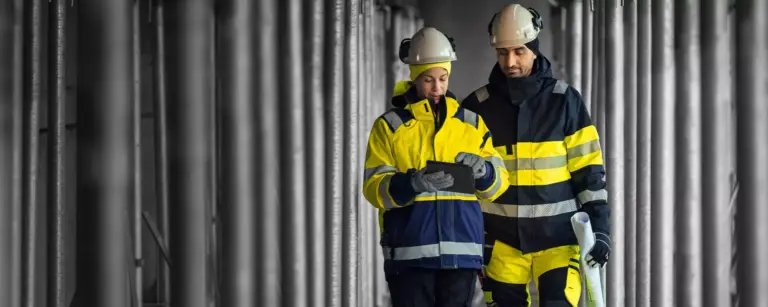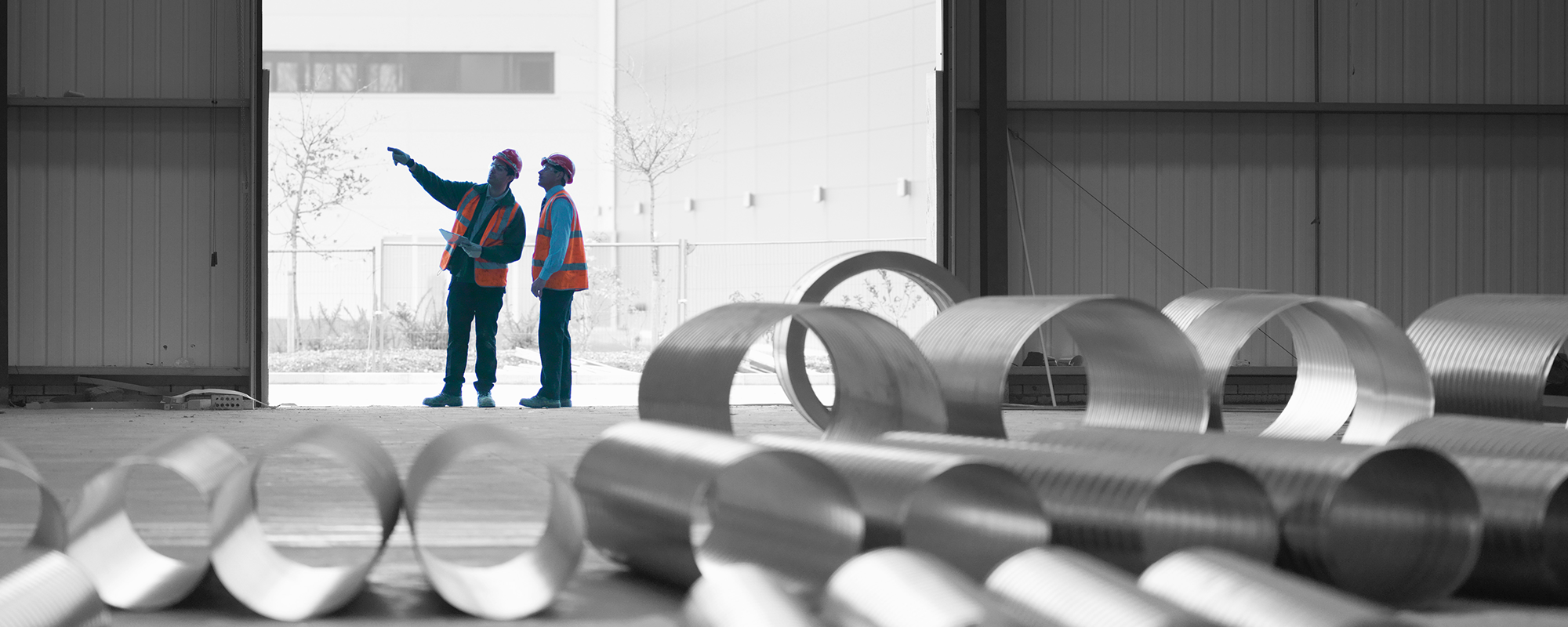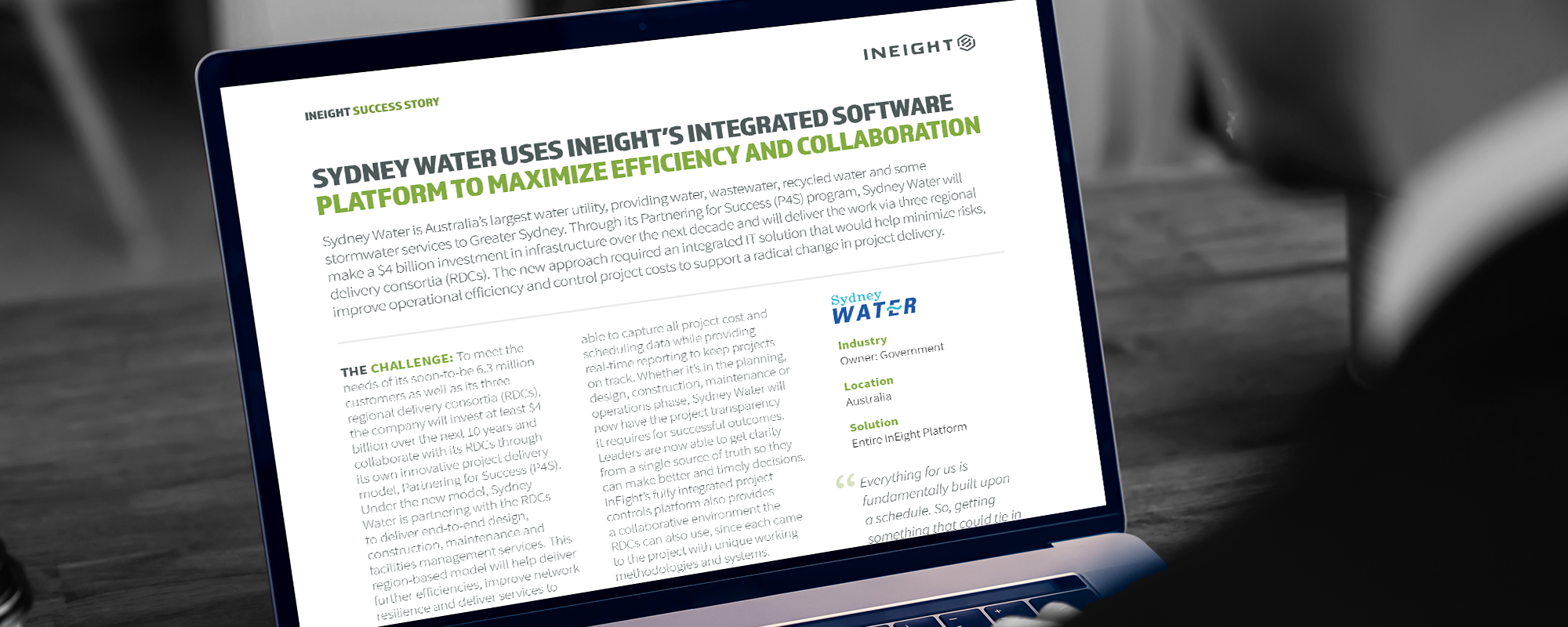T&T Construction: How Your Business Can Thrive During Good and Bad Times
Watch our InEight management software webinar on how your business can thrive during good & bad times. Our webinars are designed to help your business.
Transcript
Rick Deans:
Hi. Thanks for joining us today. I’m Rick Deans, Executive Vice President of Industry Engagement with InEight. Well, with us today is Rob Trulson. CEO of T and T Construction. Rob, it’s always good to see.
Rob Trulson:
Doing great. Good to see you.
Rick Deans:
Real good. Real good. So tell us a little bit about your company.
Rob Trulson:
We’re, heavy highway, mainly underground large diameter pipe company. We’ve been in business in Arizona for thirty-five years since nineteen eighty three.
We spawned from a company out of Wisconsin. It was actually, established in nineteen fifty three by four World War two veterans. One of them being my father. Okay. And we are now transitioning to the third generation. My second son, Jared, and my fourth son, Jordan, who’s gonna be joining us, in December after he graduates.
Rick Deans:
Great.
Rob Trulson:
From GCU.
Rick Deans:
So you mentioned you spawned off a company that was, started in Wisconsin. That’s how you got into the business?
Rob Trulson:
Yep. That’s how I, went to University of Wisconsin Madison. Graduated, business engineering degree and was on my way to New York with a job. My father was at a in a time where he was looking to retire. And he always says it takes about five years to train somebody to where they’re to a point where they can make ninety percent of the decisions on their own. And so he was looking to get out, and he needed somebody to replace them, and gave me an offer I couldn’t refuse.
Rick Deans:
There you go.
Rob Trulson:
So I got into it then and, been in it ever since.
Rick Deans:
That’s great. What do you like most about what you do.
Rob Trulson:
Its the variety. The people you meet, there’s never a day that it’s the same. I enjoy taking, right, taking on difficult projects, figuring out a way of building them, building them more efficiently. Obviously, safety is always an important factor of ours.
In the underground industry, it’s, it it can be very dangerous. So we take very good pride in our safety record.
And, and the people you meet, the relationship you, you develop throughout the years.
Rick Deans:
Being a family owned business here the valley for thirty five years. I’m sure you’ve seen the valley change a lot.
Rob Trulson:
Oh, yeah. It’s, when we moved out here, Scottsdale Road was a dirt road north of Shea Boulevard. There was no one zero one, there was no two zero two. So we’ve seen a lot of lot of growth. We’ve, my kids always laugh when we were driving when they were younger, I’d say, yeah, we put pipe under this road here. We put pipe under this road here.
Rick Deans:
You know, when I first met you, ten or twelve years ago, you’d mentioned something that stays with me today. And that was never want the company to get so big that I don’t know the names of my employees and their kids when we go out and have picnics. So does that still resonate within the organism?
Rob Trulson:
Yes, it does. It’s, you know, it’s, you know, let’s say we’re in a transition where I’m I I it’s a joke. I’m too young to retire, so I’m laterally transitioning to a consulting position. And, It’s up to them, but what they’ve what what they have seen and what I have tried instill on them is that you can become really, really big all you’re doing is taking on more and more headaches.
So if you, you know, we’re, you know, we do between twenty and twenty twenty, twenty and thirty million dollars a year, which is a medium sized company, and and yet you can go on to a job site and you know everybody that’s working for you.
Rick Deans:
Sure. So being a a family owned business, what what sort of challenges do you run into here running the company?
Rob Trulson:
You know, there’s it’s an there’s advantages. You know, you’ve got obviously, you you’ve got family involved. I was always told by my our father that, business is business and family is family. You know, I can remember when I was younger, having some pretty heated discussions in the office, and then going to our moms for dinner and that that’s family. It’s done. We don’t look at just immediate family. All of our employees are part of our family. We’ve got about thirty five people work someone who worked for us for over thirty years.
And, it’s important that, I would like I told you before, when I walk, you know, go out into a job site, I wanna know everybody that’s out there, and I wanna know their wives and kids’ names.
Rick Deans:
I’m sure being in business thirty five years. It’s we’ve the business is very cyclic like We go through bumps. What are some of the ways that you’ve managed to survive during some of the the bumpier times?
Rob Trulson:
Oh, the, oh, I call it the ’08 crash. We it was we had a backlog of work before that hit. And then We saw everything just go like this. And we got, you know, I, like, I call second night. Most of our work is hard bid, and we couldn’t pick up a job to save your soul. We got to a point where we were actually bringing our guys into the yard and painting equipment.
But we made the decision that we don’t need to work for practice. And if we weren’t able to make a fair profit, and cover the overhead on the, on a project we weren’t gonna take it. And we survived that time.
Rick Deans:
And those those fellows, those those folks that you took care of and you kept busy during that period of time. I’m sure that they appreciated it.
Rob Trulson:
Yeah. And there still with us.
Rick Deans:
Still with you today?
Rob Trulson:
Yep.
Rick Deans:
Well, that’s great. That’s great. Tell us a little bit about how you win new business, Rob, or new customers, new new contracting agencies that…
Rob Trulson:
Well, the industry is changing. I mean, they’re a lot of it is moving to what they call alternative delivery systems. Which is centimeters at risk, design build. We’ve done, we just completed a big design build for the Peter Maricopa irrigation project with a, pump station and, and, discharge pipeline.
We’re we’re finding more. It’s more of a combination. And, we’ve we’ve never, you know, we’ve we’ve submitted on a lot of CEMA, at CEMA, CEMA, and and design builds. We’ve won a few. Our fair share, I’d like to say.
And and we’ve also gotten, hard bids.
Rick Deans:
That’s great. That’s great. Tell us about some of the relationships you’ve cultivated with some of the contracting agencies here in the valley.
Rob Trulson:
You know, throughout the years, you know, we’ve we’ve got a good relationship with the City of Phoenix, City Chandler, you know, Pima, Pima Maricopa irrigation project. We built their first, irrigation part section of their irrigation pipeline. It was a, eighty four inch pipeline.
And, and, you know, the thing what I’m noticing though is is that as as I age out. You know, I’m sixty one years old. As I age out, so are the people that I’ve, developed relationships with. But you know, with Jared and Ben, who are are taking over, they’re developing their own relationship with the entities and and the owners and and engineers.
Rick Deans:
One of the topics that gets thrown around a lot is digital transformation. What does digital transformation mean to you, Rob?
Rob Trulson:
Well, you know, I’m I’m looking over thirty five forty years. It’s been huge. I remember when I first started learning how to estimate it was done on a legal pad where everything was in pencil and everything was hand calculated.
And that’s transformed now to, we use InEight’s estimate system where you’ve got thousands and thousands of bid items pre pre worked up. And, plus you’ve got, you know, the communication, revolution with cell phones.
You know, we went we went from, pay phones to a radio so we had a trunk radio system, Motorola, a trunk radio system, which we thought was unbelievable that you could talk to anywhere in the state, you know, what, you know…
Rick Deans:
And didn’t need to bring a role of quarters.
Rob Trulson:
Yeah. I didn’t need to bring well, You had to, you know, you had to call the office. If you wanna make a phone call, you had to call the office and have them make the phone call for you. But then that went to cell phones.
And and there’s there’s good things and bad things for that. The one of the bad things I’m noticing is is that the speed of things is almost more than a person can handle. They’re they expect to be able to get ahold of you immediately. And they’re expecting answers immediately.
I’m finding that the younger, people in the industry coming up are not learning to plan efficiently, you know, where you had to be thinking about something a week ahead, they’re thinking they’re only having to think about a day ahead because they can just get on their cell phone to talk somebody. So we have to spend a lot more time on that with them, getting them because, you know, even though you can get ahold of somebody right away, doesn’t mean they’re gonna be available.
Rick Deans:
Or have the answer that you’re looking for. Yep. Interesting. What are some of the design or the decision criteria that you make before you bring in any soft or hardware in the organization?
Rob Trulson:
You know, I’m a self proclaimed, you know, tech nerd. You know, I’ve been that way ever since it’s come out. And But one of our main, protocols is is that it has to make your job easier. If it makes it more difficult, it’s not worth it. We’ve tried a software that we thought was gonna be, be, make you more efficient, and it turned out it wasn’t.
You know, we, one of your main competitors for the document management that we’re using with InEight. It would take two days to set a job up. Doesn’t matter if it was a fifteen million dollar job or a five hundred thousand dollar job. It still took that same amount of time. And I found that where it was very robust, people were were hesitant to use it because it didn’t make their job easier.
Rick Deans:
So you’ve been a customer of ours for many, many years. Can you tell us about how that relationship started?
Rob Trulson:
Yeah. We, had one of your competitors’ estimate system. They were our second estimate system. Like I said, I’m a tech nerd. So, you know, we went from spreadsheet to another one, to then your main competitors. And one of the problems we had with with their system, it’s a very good estimating system project management system. But they had no way of of, taking information that the foreman had already submitted to the office and generating a time and materials invoice.
A lot of our work, we have contract work, but there’s a lot of time and materials extras. You know, you run into a utility that wasn’t supposed to be there. They asked for an additional, depth on a cut of pipe or whatever.
So I had a stack of change orders that I needed to process that was literally this this tall. And that’s revenue that’s not being realized. And my brother and I were in business together at that time, and he was constantly in my office going, you need to get these done, you need to get these done. Well, in order to get them done, I had to literally create a new job, reenter in the timesheets as if they were done, and then print everything out. Okay?
Like I said, we were very happy with the estimate system. We had everything set up. And a couple of your salesman came in back. I think it was about nineteen ninety one. And we’re offering, back then, it was called PSX. It was a dos based system.
And I said, you know, we’re not interested in changing, and we they showed me a little bit about it. And so I just made the offhand comment while I’ve got all these change orders sitting here. Can you print can you compile and print a change order from the timesheet that’s been turned in as Tina. And they said, yes.
And they said, prove it. And they did. And I said, we’ll buy it.
Rick Deans:
Can you list three things off the top of your head that you like about InEight solutions?
Rob Trulson:
I like the accuracy, and knowing that I don’t have to worry about any errors in a spreadsheet.
I really like the quote system, the quote management system. It allows us to analyze. We get a lot of different quotes, especially on materials for pipe. We do our own, you know, everybody does their own take off.
The the if you wanna call them the pipe house, you know, do their own take off. Well, we have to compare them to determine who’s gonna get the, you know, who’s low. Our our theory is if you’re low with us, you get the job. We don’t negotiate after the fact. It allows us to take our take off, put in their unit prices, and see where they actually are, and and compare them.
And then the other thing is is the storehouse estimate. We’ve got thousands and thousands of of, different bid items pre bid. Mhmm. And we have them pre bid to where they’re worst case scenario.
So if we have somebody that’s not very familiar with estimating or hasn’t been doing it a lot. And they get in. We so we always do an in house review.
But if something happens and we don’t, we know that we’re we’re bit at the worst case scenario. So we don’t have to worry about somebody forgetting an important part of a job.
Rick Deans:
Or a productivity rate that’s too ambitious.
Rob Trulson:
There you go. There you go.
Rick Deans:
That was a large diameter typing contractor, you’re probably dealing with lots and lots of material items. Is there a way to keep?
Rob Trulson:
Your quote system, the quote management system is very robust. We use it extensively.
We do our own takeoffs for, we just, did a project for, for PME that The quote that came from the pipe store houses were thirty one pages long. And so they have their own take off. We have our own take off. So what we do is we enter in their unit prices based upon our takeoffs.
We can compare them, based upon what the materials we think are gonna go into the job. And and we have a policy that if, company is low with us at time of bid, and we’re able to use their number, they get it to us soon enough, we don’t we don’t go out after the fact and try and…
Rick Deans:
You don’t shop there.
Rob Trulson:
We don’t shop numbers. No. So we can honestly tell them and we’ll show them anything that they wanna see. After the bid, that here’s where you were, here’s where your competitors were, and this is, you know, and we actually on this project three and a half million dollars materials order was separated by less than two thousand dollars between two to reverse suppliers.
Rick Deans:
Wow. Wow. And that’s how you stay in business for thirty five years.
Rob Trulson:
Well, you don’t you treat people right and everybody knows that we don’t numbers. We’re not gonna tell anybody anything before a bid.
They know if they they can they can give us their number two hours, three hours before the bid, and and it’s gotten to point out where nobody even bothers calling us to find out where how they look. Because they know the answer they’re gonna get is you look like a pipe salesman because we don’t give out any of that information.
Rick Deans:
That’s great. Tell us about some of the other software and technology you use here in the office, Rob.
Rob Trulson:
Colonium system, we use Sage Timber Line, which integrates with, you know, with InEight.
We also use the job tracking and the timesheet collector. So all of our foremen enter their timesheet in their pickup off of a laptop. They’ve got an air card. It gets transmitted to the office. It gets reviewed in the office, and then it goes to the timesheet, warehouse.
At the we run our payrolls on Monday, so on Monday, one person is assigned to to compile all of the timesheets. The only thing that we have to really change is if there’s any overtime that’s associated with it, because we don’t make our guys track over time. So they they’ll change one of the last time sheets and then it gets exported to the timberline, software, which eliminates us having to re key in all of the hours.
Because our most of our work a lot of our work is Davis Bacon work, and they require, certified payroll, which it has to be done by the day. You can’t just say somebody worked forty eight hours in a week. They need to see it by day. And so we’re able to produce those reports through Timberline because of the interface with, InEight’s job tracking and and time she wear all.
Rick Deans:
That’s great. So you get the opportunity to review the data, make any corrections, add the overtime, and then don’t have to re key it into another system.
Rob Trulson:
Yeah. Which which eliminates errors.
Rick Deans:
And you mentioned job tracking or field data collection tools. You mentioned an estimate. Are there other innate products that you’ve looked at?
Rob Trulson:
Like I said, before. ,We were with one of your, other competitors, and it was it was becoming too cumbersome to use. It was very robust, but too cumbersome to use. So I saw, at the IAG conference that we had, documents. And, and so we’ve adopted that.
We’re also in a trial stage for plan progress and control, which is a web based system for that would take the place of timesheet collector and job tracking.
We’ve just gone through, Jared to spearheading that. We’ve just gone through the implementation and training. Mhmm. And we’ve identified a few things that need to be changed for it to work for us.
Which, you guys are working on at this point right now.
Rick Deans:
That’s great. And I know you’ve, you’ve been a great source of product suggestions to us over the years.
Rob Trulson:
Like I said, you give it to us. We’ll break it.
Rick Deans:
Great. So what’s next for TNT you mentioned about transitioning from the second generation to the third generation?
Rob Trulson:
You know, we’re like I say, I’m laterally transitioning to a consulting position. I’m, I’m to a point where, it’s the younger generation’s time to, to go out and and and see what they what they wanna do. You know, we don’t really see any changes as far as the line of work we’re in.
Very wise man told me shoemaker stick to your trade. In the past, we’ve tried different lines, and have always come back to putting pipe in the ground.
Rick Deans:
Yep.
Rob Trulson:
And that’s what we do well. We guarantee our workmanship for life.
And we’ve never had to, never had to go out and, and, fix anything.
Rick Deans:
Okay. Great. Well, Rob, this has been super helpful.
Thank so much for your time. We’ve learned a lot. And as always, we really appreciate you being a customer of ours.
Rob Trulson:
No problem.
Rick Deans:
Thank you. Thanks for joining. Us today. We hope you learned a lot. Check out InEight.com for a complete list of our upcoming webinars.








